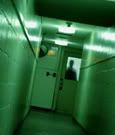Dororo
Lee Marshall in Udine
02 May 2007 13:10
Dir: Akihiko Shiota. Jap. 2007. 135mins.
It's easy to see why Dororo, a period action fantasy feature, wowed the Japanese box office earlier this year: like its eponymous heroine, it swaggers and blusters, but for those who have an inner child to unlock – or who are simply in the mood for some rumbunctious Sinbad-the-Sailor-style entertainment – it delivers the goods.
Based on a 1960s manga that was serialised on Japanese TV, the film throws fast action fights, comic interludes, macabre horror, giant monster attacks and romantic sparring carelessly into the dramatic blender – but despite some tonal and stylistic unevenness, the film's nonchalance and refusal to take itself too seriously is all part of its sprawling charm. The film is the most successful Japanese release of 2007 so far, taking just over $27m in a seven-week reign in the top ten. DVD prospects look equally buoyant.
Universal picked up North American rights earlier this year, and producer TBS – one of Japan's largest broadcasters – has sold it in around 20 other territories. Subtitling and the culture gap will inevitably narrow Dororo's audience abroad, excluding most of the under-14s that contributed to its triumphant home march.
But this could nevertheless play wider than most manga adaptations, and the existence of a PlayStation user base for Blood Will Tell, a game adapted from the original 1960s series, will ensure that at least some western adolescents will recognise the Dororo franchise. Two sequels have been announced, to be shot back-to-back.
Unusually, the title character is a sidekick: the film's obvious hero, in script terms, is Hyakkimaru (Satoshi Tsumabuki), a young and handsome swordsman whose mission is to kill the 48 demons that are in possession of 48 parts of his body.
There's an obvious Frankenstein parallel here, but also shades of Pinocchio: Hyakkimaru's father, a stern, cruel warlord called Lord Daigo, allowed demons to raid his baby son for spare parts in return for the gift of invincibilty; but the abandoned, newt-like infant, mouthless, eyeless and limbless, was found and adopted by a sorcerer-scientist.
He slowly transformed Hyakkimaru from blob to man by fashioning him a series of artificial organs and prosthetic limbs. His hands come off to reveal swords, which Hyakkimaru uses to battle the fearsome – but also rather comic – CG demons that have the body parts he needs to feel fully human.
During one such fight, poster-boy Hyakkimaru – played by Tsumabuki with the melancholy detachment of an Edward Scissorhands – is noticed by street thief Dororo (Kou Shibasaki). She covets his magic sword-arm, and decides to tag along until he gets his real arm back – at which point the sword will drop off and she can snaffle it.
Dororo is a swaggering tomboy whose tough exterior conceals a vulnerability which is explained by an uninspired, contractual backstory. There's a neat silent-comedy quality to Shibashaki's performance here which is far removed from the romantic firefighter she played in last year's disaster epic The Sinking Of Japan: as with all the best screen tomboys, we know perfectly well that the more she struts and scraps and scowls, the more she's falling for her partner. It's telling that in the original manga and TV series, Dororo was a little kid – here, she's made the same age as her partner in battle, to get the sexual chemistry going.
Like Lord Of The Rings, Dororo was shot on location in New Zealand, which stands in credibly for a semi-legendary Japan at a time when the barrier between the human and spirit worlds was more permeable.
The film is hardly groundbreaking in its use of computer- generated special effects, though at times, the monsters are deliberately retro, like the huge sticky-tongued komodo dragon that the two pals battle at a certain point.
The yellow film stock effect and jerky editing make it clear that this sequence is a jokey homage to the tokusatsu genre of low-budget superhero TV shows. And when the audience see Lord Daigo's castle in the distance, it's so obviously fake that it looks like something Hayao Miyazaki might have drawn.
But while those expecting a glossy and consistent CGI look à la 300 will be disappointed, Dororo's visual unevenness is – mostly – part of its rambling, picaresque charm.
The music stresses the Spaghetti Western feel of the hero's quest, its gravelly instrumental ballads and jigs stressing the film's brand of parodic, tongue-in-cheek adventure.
Production company
Tokyo Broadcasting System
International sales
Tokyo Broadcasting System
Japanese distribution
Toho
Producer
Takashi Hirano
Screenplay
Masa Nakamura
Akihiko Shiota
based on the manga by Osama Tezuka
Cinematography
Takahide Shibanushi
Production design
Tomoyuki Maru
Editor
Toshihide Fukano
Music
Goro Yasukawa
Yutaka Fukuoka
Main cast
Satoshi Tsumabuki
Kou Shibasaki
Kiichi Nakai
Yoshio Harada
Eita
Anna Tsuchiya
http://www.screendaily.com/ScreenDailyA ... ryID=32157
Dororo (Screen Daily Review)
3 posts
• Page 1 of 1
Dororo (Screen Daily Review)
???? Better to light a candle than curse the darkness; Measure twice, cut once.
Pinyin to Wade-Giles. Cantonese names file
Pinyin to Wade-Giles. Cantonese names file
- dleedlee
- HKMDB Immortal
- Posts: 4883
- Joined: Wed Aug 01, 2001 7:06 pm
- Location: USA
3 posts
• Page 1 of 1
Who is online
Users browsing this forum: No registered users and 9 guests

